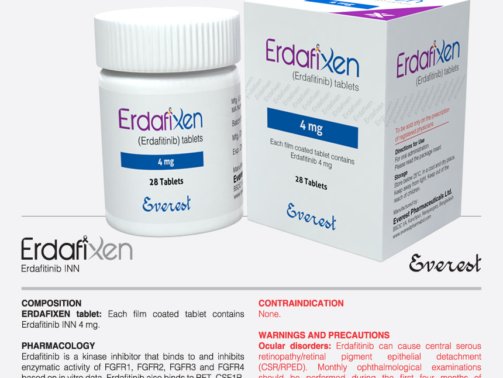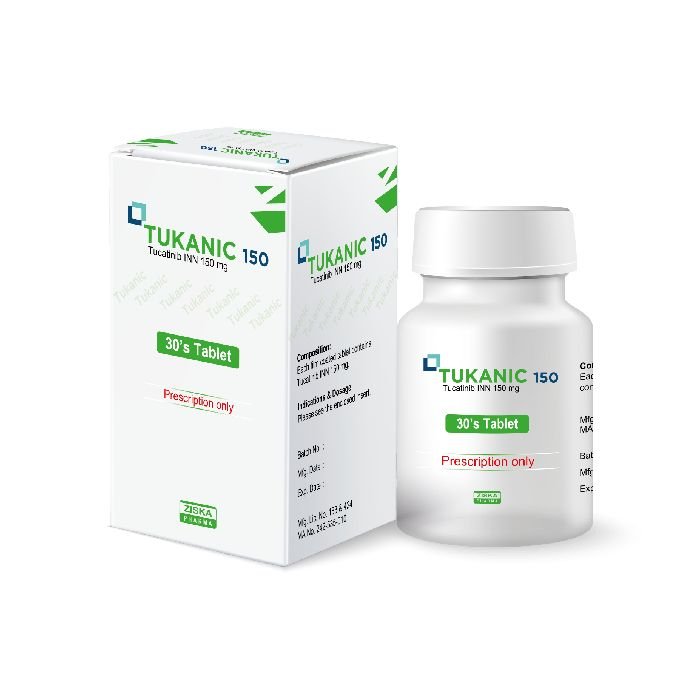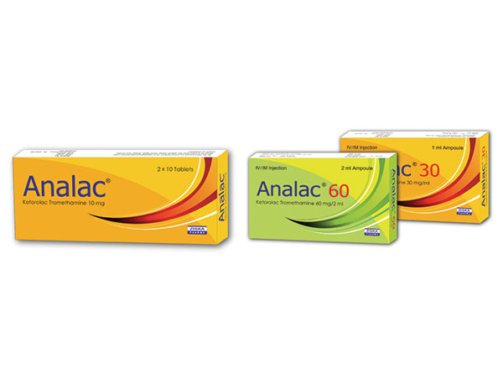Tucatinib 150 mg (Tukysa)
0.00$
Tukanic (Tucatinib) 150 mg is a medication used in the treatment of HER2-positive breast cancer. It belongs to a class of drugs known as tyrosine kinase inhibitors, which work by blocking the activity of the HER2 protein, a receptor involved in cancer cell growth. Tukanic 150 mg offers a targeted therapy option for patients with HER2-positive breast cancer, helping to inhibit tumor growth and improve treatment outcomes.
Tucatinib 150 mg, also known as Tukysa, is an oral prescription medication primarily used in the treatment of HER2-positive breast cancer. It is a tyrosine kinase inhibitor (TKI) specifically targeting the human epidermal growth factor receptor 2 (HER2), a protein that stimulates cancer cell growth in certain types of breast cancer. By blocking this receptor, tucatinib reduces or inhibits the growth and development of cancer.
Tukysa is most commonly administered in combination with other cancer therapies, trastuzumab (Herceptin) and capecitabine, to improve the clinical response in metastatic or advanced HER2-positive breast cancer, including brain metastasis.
Key Features of Tucatinib 150 mg (Tukysa)
Targeted Therapy: Preferentially inhibits the HER2 receptor with minimal effect on EGFR (epidermal growth factor receptor), hence reducing off-target side effects.
Oral Administration: Patient-friendly-to-swallow tablets allow patients to administer their treatment at home with no need for intravenous infusion.
Demonstrated Effectiveness: Trials have established prolonged progression-free survival and increased overall survival in patients receiving Tucatinib.
Penetration into CNS: Effective against brain metastases of HER2-positive breast cancer since it penetrates the blood-brain barrier.
Indications and Usage
Tucatinib 150 mg is indicated for use in combination with trastuzumab and capecitabine in adults with advanced unresectable or metastatic HER2-positive breast cancer who have received one or more prior anti-HER2-based therapies in the metastatic setting.
This includes patients with brain metastases, where tucatinib has been shown to demonstrate clinical benefit in the control of CNS disease, which is normally challenging to manage with standard therapies.
Mechanism of Action
Tucatinib blocks the intracellular signaling pathways of the HER2 receptor. Overexpression or amplification of HER2 leads to increased proliferation and survival of the cells. Tucatinib blocks the tyrosine kinase domain of the HER2 receptor, thus inhibiting its signaling activity. Such activity blocks tumor growth and triggers cancer cell death.
Unlike non-selective HER2 inhibitors, tucatinib is neither particularly active against EGFR, the culprit behind side effects like skin rash and diarrhea. This selectivity also explains tucatinib’s favorable safety profile.
Dosage and Administration
Strength: 150 mg film-coated tablet
Recommended Dose: 300 mg (two 150 mg tablets) oral twice daily, with or without food.
Tukysa is commonly used in combination with trastuzumab and capecitabine, as a cycle-based regimen under the direction of an oncologist.
Tablets should be swallowed whole—avoid crushing, chewing, or splitting.
Side Effects and Safety Information
Like all cancer medicines, tucatinib has side effects. The most common side effects are:
Diarrhea
Fatigue
Nausea and vomiting
Palmar-plantar erythrodysesthesia (hand-foot syndrome)
Raised liver enzymes (ALT, AST)
Anaemia
Less common but serious side effects include:
Hepatotoxicity: Liver function needs to be monitored on a regular basis.
Complications of diarrhoea: Diarrhoea can be an issue if it continues and leads to dehydration and electrolyte disturbances unless treated promptly.
Precautions
Regular monitoring of liver function and complete blood counts is recommended during treatment.
The patient’s pregnancy status should be tested before treatment is started. Tucatinib has the potential for fetal harm and is not recommended for pregnancy or breastfeeding.
Drug Interactions
Tucatinib interacts with certain drugs, including:
CYP3A inhibitors or inducers (e.g., ketoconazole, rifampin)
Proton pump inhibitors or acid-altering agents
Anticoagulants such as warfarin (since it is metabolized in the liver)
Patients need to inform their health care provider of all their medications and supplements.
Clinical Trials and Efficacy Data
HER2CLIMB is a pioneering clinical trial demonstrating efficacy of tucatinib in HER2-positive breast cancer. Tucatinib administered together with trastuzumab and capecitabine to the patients proved to have:
Improved progression-free survival (PFS)
Prolonged overall survival (OS)
Slower time to CNS progression in patients with brain metastases
These observations have led to the extensive usage of tucatinib in HER2-positive treatment protocols around the world.
Storage and Handling
Store at room temperature between 20°C and 25°C (68°F and 77°F).
Protect from heat and dampness.
Out of reach of children.
Conclusion
Tucatinib 150 mg (Tukysa) is a significant advance in the treatment of HER2-positive breast cancer, especially for patients with metastatic disease and brain metastases. Its targeted action, oral route, and proven clinical benefits, Tucatinib provides new hope and improved quality of life for those with this aggressive cancer.
Order Now At Mdx Pharma bd….
To order from MDX Pharma BD, visit their website at https://mdxpharmabd.com, where you can browse products and place orders online. For inquiries or orders via email, contact emedicarepharma@gmail.com. Alternatively, call (+88) 01929123476. Their address is 29, Abdullahpur, Uttara, Dhaka-1230, Bangladesh.
1. What is the purpose of tucatinib?
In adults who have received at least one other chemotherapy drug, tucatinib is used in combination with trastuzumab (Herceptin) and capecitabine (Xeloda) to treat a specific kind of hormone receptor-positive breast cancer that has spread to other body parts and is not amenable to surgery.
2. Is chemotherapy a part of HER2 targeted therapy?
The majority of patients with HER2-positive breast cancer will get trastuzumab, an anti-HER2 antibody, in addition to one or more chemotherapy medications. These treatments significantly increase the survival rate of individuals with HER2-positive breast cancer, according to numerous studies.
3. Tucatinib: is it approved?
The FDA has approved trastuzumab (Herceptin) and tutukinib (Tukysa) to treat some patients with colorectal cancer whose tumors overproduce HER2 proteins. The medications, however in diverse ways, inhibit the action of HER2 proteins.
4. Does trastuzumab cause tumors to shrink?
HER2-positive cancer cells are the target of the medication trastuzumab (Herceptin). It can be taken either by itself or in conjunction with chemotherapy. Trastuzumab has been shown in studies to reduce tumor size and increase survival in patients with HER2-positive metastatic breast cancer.
5. What advantages does lapatinib offer?
Lapatinib is a member of the class of medications known as antineoplastics, or cancer medications. It prevents cancer cells from proliferating and ultimately kills them. Other adverse effects will potentially arise because the medication may also impact the growth of healthy cells.
| Generic Name: | Tucatinib |
|---|---|
| Theraputic Category: | Anti-Cancer |
| Pack Size: | 30’s |
Related Products



 Cart is empty
Cart is empty 

